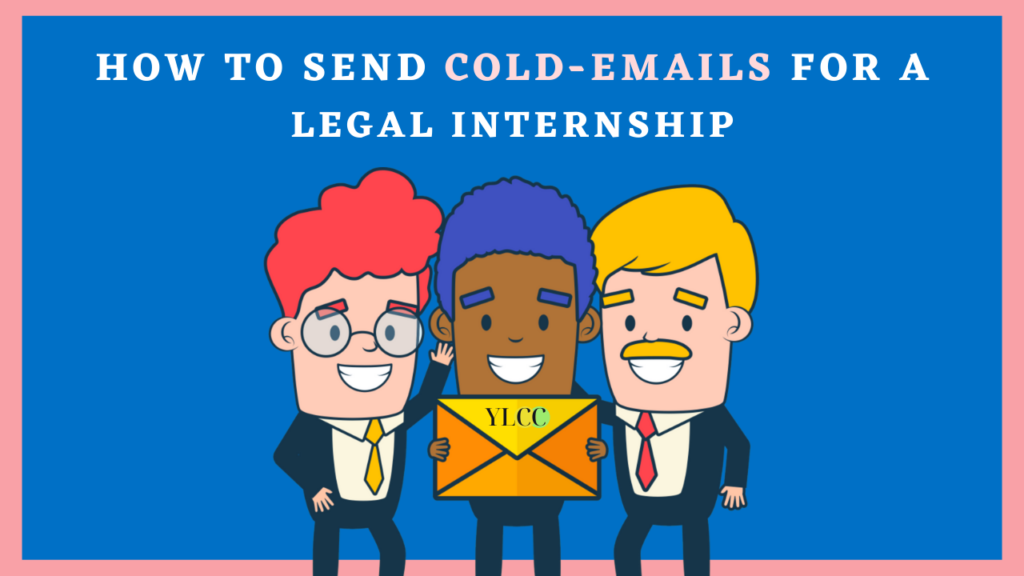
Unlike the usual practice of conventionally searching for opportunities, cold-emailing recruiters is all about creating opportunities out of thin air. While others are busy looking for vacancies, you may end up securing an internship at a firm that not released a notification in the first place.
In this article, Team YLCC highlights how you can send cold emails to secure quality legal internships. Read on!
CONDUCT THOROUGH RESEARCH
Cold-emailing is a strategy that works only for those who plan well before diving into the far end. As a law student, you should shortlist 2-3 organisations/firms you want to send a cold email to. A common mistake people end up making is bulk mailing recruiters- this is ineffective and unprofessional.
You may shortlist organisations or firms on the basis of your areas of interest or convenience. Once that is done, try to find more about the recruiter and the firm. Needless to say, this is the first and an important step to drafting a good cold email.
SETTING UP A PROFESSIONAL EMAIL ADDRESS
Remember the first email address that you created with inspiration from your favourite fictional character?
No, that would not work here.
You must create a new email account to use for professional or educational connections moving forward (some law schools provide students with one). Currently, Gmail is the most preferred choice for millions of users across the world. When creating your new email address, go for something simple and straightforward. Consider a combination of your name or initials to make the email unique. It is also important to make certain that the name of the Google Account you are using for your email address is properly capitalised.
NAILING THE SUBJECT LINE
The most glaring issue with cold emails is that they do not get opened. The subject role is of key importance here as this is the only element of the communication visible to the reader before opening it.
An ideal subject line in a cold email is customised for the organisation to include its name, at least.
PERFECT THE GREETING
The greeting is the first part of the mail and it is important not to make a mistake here. An incorrect or unprofessional greeting can create the negative first impression on the recruiter and spoil your chances.
If you are emailing a recruiter or someone who you have never met, it is ideal to begin with “Dear Mr./Ms./etc. [Last Name].” Just make sure to do your research so you avoid using the wrong honorific or pronoun; if you really cannot tell which you should use, try “Dear [First Name] [Last Name].”
In a different scenario, believe they’d be happy with less formality (e.g. if they work at a law firm with a casual culture), you can go with “Dear [First Name].”
AN IMPACTFUL INTRODUCTION
A strong introduction will include two things:
- Your specific interest in the company
- Your clearly stated desire to intern with them
Here one should also include their available time frame. The application should be unambiguous in mentioning the months you are applying for so that the recruiter can take a call accordingly. An ideal introduction looks something like this: “For the past six months, I have closely followed your firm’s cases and achievements. I am writing to inquire about summer internship opportunities that might allow me to become involved with this important work that the Arbitration team is doing.”
DEMONSTRATE YOUR ELIGIBILITY
After your introductory paragraph, give some brief background about how your life experiences, both professional and academic, lend themselves well to the company. For example, if you are applying for an internship at an intellectual property law firm, you can mention a research paper you have written on the subject. Highlight one or two specific accomplishments and tie them back to current projects with the firm. Doing so establishes that you are a good fit and are committed to a career path that aligns with their goals.
THE MANDATORY CALL TO ACTION
If the recruiter is interested in your application, what is the next step they can take?
As a Call To Action, you can mention your phone number or some other channel of communication so that the recruiter can connect with you for further discussion.
FOLLOWING UP WITH THE APPLICATION
Following up with your application also requires its own strategy.
Once you have sent the emails, it is important to give the contacts some time before following up- otherwise you are likely to come across as impatient. The wait is indeed stressful, but it could be useful to remember that in law firms or legal organisations, everyone is busy, and they may just need a few days to get to your note. Once a week or more amount of time has transpired, the candidate can send a friendly reminder of his or her application.
It is important to send the follow up mail in the same thread of the original application to save the recruiter time and trouble.
This is what a follow up usually looks like-
Dear Mr. Recruiter,
I hope this message finds you well! I recently inquired about a possible summer internship with ABZ Law Firm and wanted to be sure to follow up.
I am very interested in working with ABZ and would love the opportunity to speak with you regarding the legal intern position. I appreciate your time and hope to have the chance to speak with you soon.
YLCC would like to thank Sachet Labroo for his valuable insights in this article.







